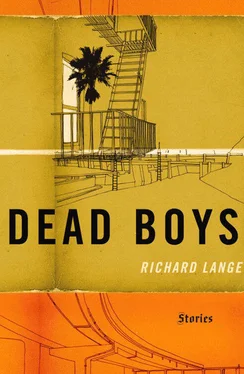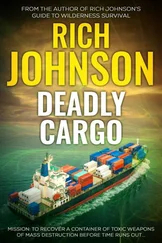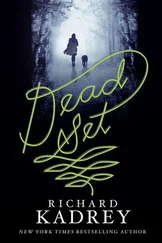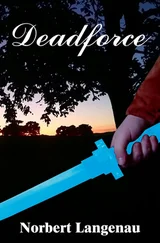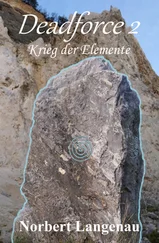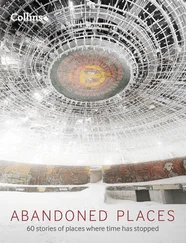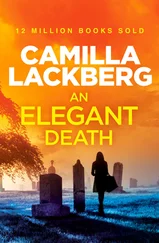“I know. Scary.”
She’s not trying to make me feel bad, but I do. I should have pulled her and Sam out of this neighborhood years ago, when the graffiti first sprouted, the first time the car was broken into. I kept thinking things would turn around. I was like that back then, all silver linings and never say die. Now, though, I acknowledge the impossible. And after Thursday — the Hole in the Wall Gang’s last ride — we’re saying good-bye to bad luck.
“Let’s start looking for another place,” I say, moving up behind Maria to wrap my arms around her and bury my face in her hair. I love her hair. I have always loved her hair.
“Maybe over in Glendale,” she says.
“How about farther? How about the mountains? Completely the hell away from here.”
“Don’t be a joker.”
“Baby, I’m serious. It’s time.”
She turns to kiss me. Her wet hands on my face smell of potatoes and dirt. She’s Cuban, brown and smooth-skinned. Her parents begged her not to marry me. They had a friend of the family lined up, a medical student, but she was as stubborn then as she is now.
“Okay, the mountains,” she says.
“The mountains.”
We rest against each other for a second, then she laughs and pushes me away. “Ahh, you’re crazy. I brought some quizzes home to correct. Go check on Sam and let me work.”
I pause in the doorway and watch as she sits at the table and takes up her pen. The curtains billow in the window behind her and dance in the evening breeze, and the shadows of the refrigerator and the toaster grow longer and cooler by the minute. She rests her forehead in her hand and smiles, and I finally understand why people are so afraid of dying. I want to be with her forever.
“PAPI,” SAM SAYS. “Hey, Papi, look.”
I jerk back out of a deep and dreamless catnap, and the sudden return of sight stings my eyes. One minute I was contemplating the brittle droop of the fronds of the palm tree outside our living room window, and the next I was gone. Even when I’m not working I’m tired all the time.
“Papi!”
Sam is almost five. He told me last week that he wants to be a doctor when he grows up so he can fix broken hearts. This evening he’s busy pulling apart his collection of action figures and recombining the pieces to create new forms of life. He slides one across the coffee table for me to look at.
“This is the man who found out he was a robot,” he explains. “He watched in the mirror and took off his face, and there was a robot head underneath. Now he drinks oil and is very, very sad. He gets mad sometimes and breaks things.”
“Does he have any friends?” I ask.
Sam purses his lips, thinking. “He’s too scary and too sad. He cries too much. If he had some money, he would buy a new head, but he doesn’t.”
“How much would a new head cost?”
“Around ten dollars, I think.”
“Here,” I say, pretending to hand the little man something. “Here’s ten dollars. Go buy yourself a new head.”
“He can’t hear you,” Sam says. “He’s got robot ears, too.”
SAM SPLASHES IN his inflatable wading pool while I set up the grill and start the briquettes. Some of the people who live in the other bungalows in our complex are cooking outside, too, and we wave at each other across the courtyard all of our doors open onto. There’s plenty of shade now. The sun is low on the horizon, coating every leaf of every tree with honey, and the birds are deep into their happy hour. The air is filled with raucous screeches as they swarm a freshly seeded patch of lawn.
“Look, Papi.”
Sam lies on his stomach and drops his face beneath the water. Bubbles fizz around his head. He rises and waits for my smile and nod, then goes under again. One of the neighbors turns on a radio, and Mexican music competes with the chatter of the birds. When we move to the mountains, I’ll build our house myself. One of those wooden dome jobbies you can order plans for, kind of a futuristic log cabin kind of a thing. I picture myself sawing boards and pounding nails. It seems entirely possible.
We eat on the porch, citronella candles pushing back the bugs and the darkening night. Burgers, Maria’s fries, and a salad of avocados and sliced ripe tomatoes dressed with oil and vinegar and lots of pepper. Sam’s damp hair clings to his forehead, and the towel Maria dried him with is still draped around his shoulders. Maria scolds him when he burps, but then I burp, too. She wrinkles her nose in disgust and pours more iced tea. The birds have quieted, and in the distance there is the faint pop pop pop of gunfire. I glance at Maria and Sam, but neither reacts, and I tell myself that it’s because they haven’t heard the shots, not that they’ve grown used to the sound.
Later we watch an old monster movie together, that one about the giant tarantula running amok in the desert. I switch from iced tea to beer. Sam is curled around a pillow on the floor in front of the television, and Maria lies with me on the couch. The weight of the day presses down upon me, and my eyelids grow unbearably heavy. I fall asleep to the sound of a woman screaming. When I awaken after midnight, Maria has moved to the floor, next to Sam, and they’ve both sacked out. I pick Sam up and carry him to bed, then gently rouse Maria, who wobbles into the bathroom.
Someone famous is selling something cheap on TV. I shut it off. A rustling outside the front door tightens everything in me like a knot. I turn out the light and edge over to the window. Pulling the curtains aside just a bit, I peek out at the porch, but there’s nothing there, just a napkin we missed when we cleaned up. Maria returns in her bathrobe and wants to know what’s wrong. I tell her not to worry, that I’m just paranoid after what happened next door. We share a glass of ice water and go to bed.
In the morning, Sam’s wading pool is gone.
MORIARTY HAS ME meet him up at Lake Hollywood. They call it a lake, but it’s actually a reservoir tucked into the hills where the movie stars live, a concrete-lined hole surrounded by a chain-link fence. Pretty enough, if you squint. Moriarty does six miles a day on the road that circles it, round and round, rain or shine. He makes me feel like a slob.
I park where he instructed me to and walk over to the fence. The still, black water is covered with a layer of dust that sparkles in the sunlight, and the smog is so thick the trees on the far shore are barely visible. Above me a big house juts out from a hill, propped up by a few spindly wooden supports. The view from the deck must be terrific in October or November, when the air clears; you can probably see all the way to the ocean, and I bet the people who live there step out every evening to lean on the railing and watch the sun set.
Moriarty pounds past me in a flat-out sprint and continues on for another hundred yards or so before turning around. He returns at a jog, throwing punches.
“Hey,” he huffs. “How you doing?”
“I’m good,” I reply.
He lifts his T-shirt and wipes away the sweat on his face with it. Another runner passes by, and they exchange nods.
“Wait at your truck,” he says to me.
I walk across the road and lean against my Nissan. Fingers intertwined behind my head, I stare out at the reservoir and contemplate the golden film of dust that floats upon it. It doesn’t seem very sanitary, this system of storage. Maria’s been after me to spring for bottled water, and I’m beginning to see her point. If the stuff that comes out of our tap originates here, who knows what kind of deadly crap it’s laced with.
Moriarty is parked a short distance up the road. He pulls a duffel bag out of his trunk. I know the song he’s whistling as he approaches. It’s a Sousa march my dad had a set of dirty lyrics for:
Читать дальше
